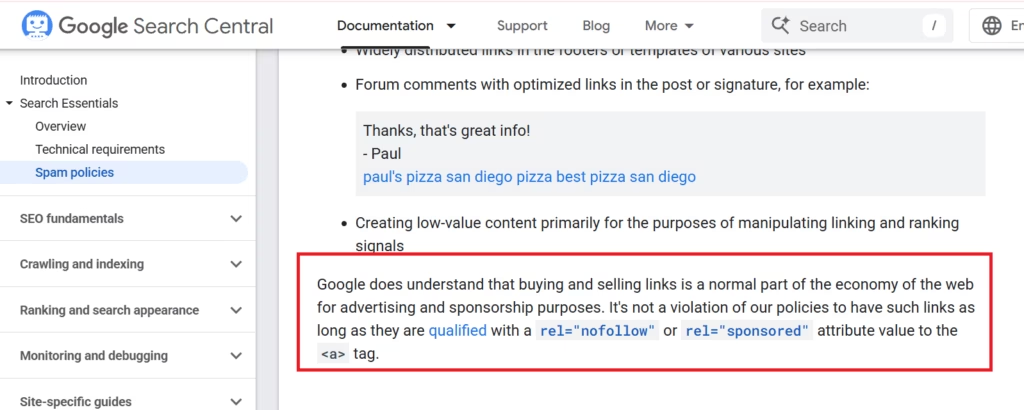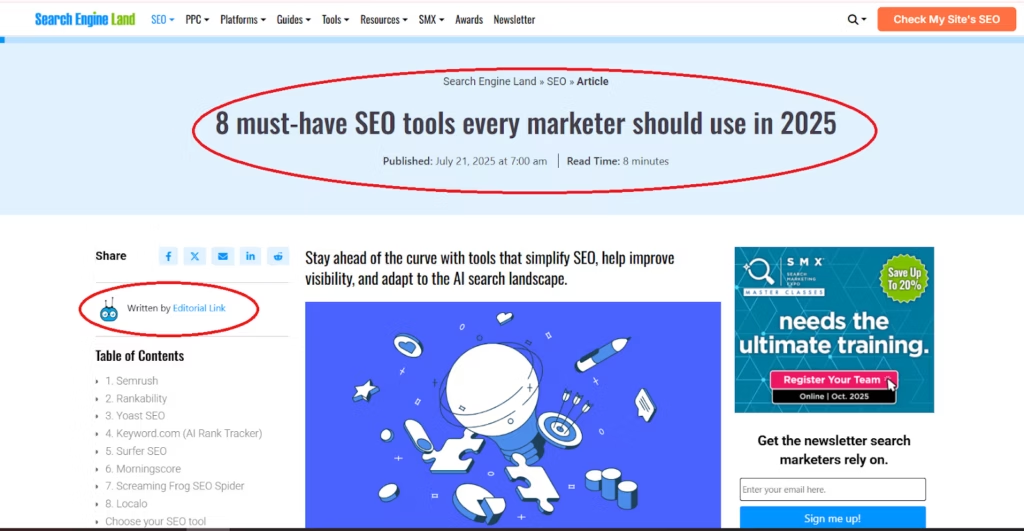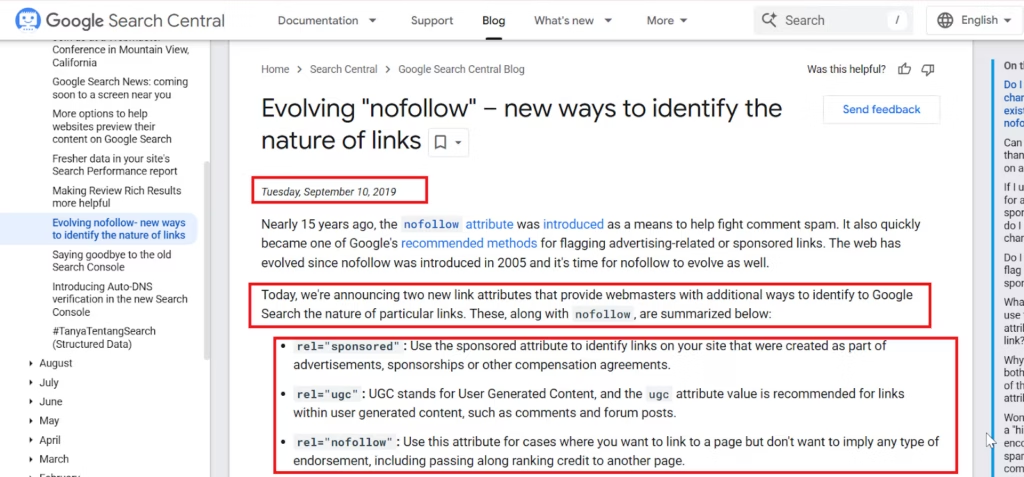Sponsored links are paid links tagged with the attribute rel="sponsored", which signals to Google that they’re ads — not standard links that pass PageRank.
In this context, sponsored links serve as a marketing and PR move rather than a direct SEO tactic.
If sponsored links don’t maximize SEO authority in the traditional sense, are they really necessary?
Absolutely!
Their value goes far beyond rankings — it’s about brand mentions and presence across the web, which matters more than ever in the era of AI Search.
This post will walk you through what are sponsored links, whether they’re safe, and why they’re a valuable asset your business shouldn’t overlook.
What Are Sponsored Links?
Sponsored links are paid links on reputable websites, bought by businesses or individuals to gain visibility and traffic.
Google treats them as ads — not as PageRank-passing links — making them a tool for exposure, not direct SEO authority.
Since Google flags paid links as manipulative when they mimic organic endorsements, adding the rel="sponsored" tag makes it clear: “this is an ad, not a ranking signal” — as per Google’s Spam Policies.

One of the most common ways you’ll see a sponsored link is through guest posting.
That’s how brands use articles to showcase expertise, gain trust, and keep their name top of mind with the right mentions.
For instance, we recently guest-posted on Search Engine Land with our take on the 8 SEO tools every marketer should be using in 2025.

Every tool featured in our roundup included a link to its homepage.
To play by Google’s rules, the publisher marked them as “sponsored” — clear, transparent, and the right way to handle what are essentially brand endorsements.

📌 Bottom line: Sponsored links won’t raise search rankings for the brands mentioned — including us as authors. But they do something just as important: put everyone featured in front of the right audience and build brand recognition. In the current AI-driven search space, that visibility is everything.
The rel="sponsored" attribute and why it matters
If you are new to the idea of “rel=sponsored”, here’s a short background note:
📅 In 2005, Google introduced the first rel="nofollow" link attribute to fight comment spam. It quickly became the go-to way to flag paid or untrusted links so they wouldn’t pass PageRank.
📅 In 2019, Google added two new attributes — rel="sponsored" for paid links and rel="ugc" for user-generated content.

💡Pro-tip! The initial rel="nofollow" attribute stayed in use but was redefined as a broader “catch-all” signal for unendorsed links.
Here’s a closer look at each attribute, how they differ, and the SEO weight they carry.
| Attribute | Meaning | SEO Value | When to Use |
| rel="nofollow" | Signals: “I don’t endorse this link” | ❌ No direct SEO value (Google may or may not count it since the 2019 “hint” update) | For untrusted or unverified links (e.g., random user comments, unvetted references) |
| rel="ugc" | Stands for user-generated content — tells Google the link came from a user, not the site owner | ❌ No SEO value by default, but Google may treat it as a hint in rare cases | Links in blog comments, forum posts, product reviews, or community submissions |
| rel="sponsored" | Marks paid placements, ads, affiliate links, or any link where money/compensation is involved | ❌ No SEO value at all (strictly non-passing) | Sponsored posts, paid reviews, affiliate links, press releases with paid placement |
To make it clearer, here’s what each attribute looks like when applied to a link:
👉 Sponsored Attribute
For example, if you bought a sponsored guest post titled “Best SEO Services”, the HTML code might look like this:
<a href="https://example.com" rel="sponsored">Best SEO services</a>
👉 UGC Attribute
Say you comment on a Reddit thread — by default, Reddit tags it with the attribute below, which blocks it from passing SEO authority.
<a href="https://example.com" rel="ugc nofollow">Check out my site</a>
👉 Nofollow Attribute
Happens all the time — when you don’t trust a site enough to endorse it, you tag it as an unfollow link.
<a href="https://spammy-site.com" rel="nofollow">Suspicious resource</a>
Can one use multiple attributes on a single link?
Yep — if a link falls into more than one category, you can combine attributes.
Google gives it the green light 🙌

Say a SaaS brand pays a marketing blog to publish a guest post about their product.
The post has an open comment section, and someone jumps in with a reply like “Try our SaaS platform” plus a link back to the sponsoring site.
In that case, you’d tag the link with a combo of attributes in the code, like this:
<a href="https://example-saas.com" rel="sponsored nofollow"> Try our SaaS platform</a>
The ¨sponsored¨ attribute applies because the guest post was paid, and "nofollow" is added so the publisher doesn’t pass authority through the link.
💡Pro-tip! The “ugc” tag isn’t used because the link comes from the guest post author. If it were from a visitor, “ugc” would be required.
How Sponsored Links Impact SEO
From an SEO standpoint, sponsored links don’t impact rankings since they’re designed NOT to pass PageRank.
Even though rel=“sponsored” links don’t pass PageRank, their real value lies in the indirect effects they trigger:
| Effect | Value |
| Referral Traffic | A sponsored link on a high-authority site can drive a steady stream of potential customers. Even with a rel="sponsored" tag, people still click — and that traffic often turns into leads, sign-ups, or sales. |
| Brand Awareness | When your brand shows up next to industry heavyweights in an article, listicle, or media feature, it sparks instant familiarity. Even if readers don’t click right away, the name sticks. |
| Branded Search Growth | The moment people start Googling your brand name, you’ve crossed from visibility into real demand. People aren’t just finding you, they’re looking for you. |
| Brand Mentions As Signal | With AI-driven search, simple brand mentions in trusted publications carry weight. LLMs often pull info from those references — even without backlinks — turning mentions into entry points for AI-generated answers. |
So, if you want sponsored links to deliver beyond SEO, zero in on sponsored campaigns that place you in niche publications your audience actually pays attention to.
At first, those links won’t move your rankings (they’re tagged rel="sponsored"). But within a few weeks, you might start noticing:
👍 More direct traffic from people who skip search altogether — they remember your brand, type it into Google, and head straight to your homepage.
👍 Rising branded search volume — proof your name is sticking.
👍 Consistent growth in high-quality leads coming straight from media site referrals.
📌Bottom line: Sponsored links aren’t built for passing PageRank — they’re built for marketing. Their value is in visibility, recognition, brand positioning, and demand creation.
And with AI Search evolving, every brand mention, inclusion, or citation can tip the scales on whether your brand surfaces in AI-generated results.
Cost of Sponsored Links
Speaking of paid link placements in content, prices vary a lot and depend on several key factors:
| Website authority | The higher the domain rating (DR/DA) and overall trust, the more expensive the placement |
| Audience size & Quality | Niche blogs with a smaller but engaged audience cost less than media outlets with millions of readers |
| Placement format | A regular link inside an article is cheaper than a full sponsored article, branded list, or a native integration in a major media outlet |
Plan for the following baseline expenses:
| Content Type | Price |
| Niche blogs | $100–300 for a link placement or a small sponsored post |
| Mid-sized industry hubs | $500–1,500, depending on format and audience engagement |
| Large media & top-tier sources | $2,000–5,000+ for a sponsored article or integration |
| Premium formats (native features, branded roundups, mentions in podcasts/videos) | Up to $10,000 and higher, especially with global media that have multi-million audiences |
When to Use Sponsored Links
Sponsored links make sense anytime you want to put your brand on the radar, spark interest, or highlight what’s new.
They’re particularly handy when you:
- Launch a new product and grab attention fast
- Promote fresh research, reports, or studies
- Break into a new market and get instant visibility
- Strengthen your credibility as an expert in your field
However, to get real value from sponsored links, don’t just sprinkle them here and there — use them as part of a larger digital PR campaign.
Digital PR gives your links real context — a story built through a press release, research study, or branded list.
With the right outlets — niche blogs, info hubs, industry news — you’re not just seen, you’re seen by the right people.
That’s how impressions become trust, and trust becomes leads.
And now, it all fuels brand mentions in Google AI Overviews, ChatGPT answers, and more — where visibility depends on authority, not just backlinks.
When to Avoid Sponsored Links
As much as there’s value in sponsored links, every now and then you’ll hear someone say they don’t work.
Usually, that’s because they’ve been used the wrong way, for the wrong reasons.
Here are a couple of instances.
| ❌ Your only goal is “SEO for SEO’s sake” | Sponsored links work when they’re tied to visibility and brand goals. If you treat them as random SEO add-ons, they’ll flop and feel like wasted spend. |
| ❌ You’re working with a tiny budget | A handful of low-cost links on irrelevant sites won’t get you far. Sponsored links deliver real impact when they’re woven into a larger PR or SEM strategy, with consistency and quality leading the way. |
| ❌ You choose lame publishers | Spending on a site that looks good on paper but your audience never reads is a dead end. No readers = no traffic, no trust, no leads. |
| ❌ Your publisher fakes audience | Some publishers pad their numbers with bots or junk traffic. Without real readers, your placement won’t get seen, shared, or remembered — and your ROI goes to zero. |
📌Bottom line: Sponsored links aren’t the problem. Treating them without a strategy is.
Best Practices for Using Sponsored Links
Your success with sponsored links comes down to a few key hows — but most importantly, how you choose your publishers.
To avoid failure, religiously check their traffic, sources, topical relevance, and audience engagement.
💡Pro-tip! Once the publisher passes the performance test, think about the format. Sponsored links deliver best when they’re part of expert pieces, side-by-side reviews, or solid research.
Next, it’s all about how carefully you use sponsorships and the rel="sponsored" tag.
Labeling your links correctly keeps your backlink profile clean and protects you from toxic links that could hurt your rankings.
Finally, just as important is how you track your results.
Sponsored links only work if you measure what they deliver.
💡Pro-tip! Don’t stop at clicks — look for sign-ups, demos, and purchases. That’s the real ROI. And watch social mentions to see if your digital PR campaigns actually made a difference for visibility and engagement.
Sponsored Link Purchase Checklist
Feeling like going rel="sponsored" is exactly what your business needs to scale brand awareness?
Great!
But before you lock in a provider, run them through this safe-purchase checklist:
1) Check traffic & audience quality
Look beyond raw numbers.
A site bragging 200K visits means little if half of it is bot traffic.
Focus on authentic readership, engagement metrics, and where the traffic actually comes from.
2) Verify niche fit
A placement on a cooking blog won’t help if you’re promoting B2B SaaS.
Your link should live where your target market already spends time.
3) Confirm format & placement
The way your link appears shapes perception.
A mention in a “Top 10 Tools” list hits differently than a passing reference in a blog post.
Placement determines whether readers actually notice and click.
4) Use rel="sponsored"
Google expects transparency.
Labeling your links properly prevents penalties, keeps your backlink profile clean, and signals you’re playing by the rules.
5) Project ROI before buying
Don’t pay for exposure blindly.
Ask:
Will this placement bring real traffic?
Can it draw in leads, sign-ups, or sales?
A link should serve marketing goals, not just SEO.
Final Words
Again, rel="sponsored" links aren’t a cheat code for quick rankings — they’re a marketing engine that goes deeper.
They spread the word, put your product in front of the right audience, and build lasting brand awareness.
In 2026, if no one’s talking about you, even quality backlinks won’t keep your SEO healthy.
However, if you need the strongest of them all, link building company - Editorial.Link has your back.
For everything else — buzz, visibility, and AI Search wins — sponsored links do the job.

